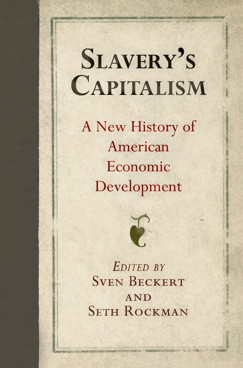 Slavery’s Capitalism has been a long time coming. The conference from which this book arose was held at Harvard and Brown Universities in spring 2011—years before the New York Times lionised a “new history of capitalism,” co-editor Sven Beckert won the Bancroft Prize for his Empire of Cotton, or fellow co-editor Seth Rockman surveyed the field in the Journal of the Early Republic. The conversations and ideas aired at that conference have been part of public scholarly discussion for the last five years, including many posts here at the Junto. Now we have the book itself, and we want to congratulate the editors and authors for their perseverance!
Slavery’s Capitalism has been a long time coming. The conference from which this book arose was held at Harvard and Brown Universities in spring 2011—years before the New York Times lionised a “new history of capitalism,” co-editor Sven Beckert won the Bancroft Prize for his Empire of Cotton, or fellow co-editor Seth Rockman surveyed the field in the Journal of the Early Republic. The conversations and ideas aired at that conference have been part of public scholarly discussion for the last five years, including many posts here at the Junto. Now we have the book itself, and we want to congratulate the editors and authors for their perseverance!
To mark the moment, we have put together a week-long forum that we hope will develop into a broad conversation. We aim to give an overview of Slavery’s Capitalism, but more than that, to ask questions and provoke debate about the state of the various fields involved in this endeavour. Does Slavery’s Capitalism, the book, represent an end-point for the scholarship that inspired it in 2011? Or is this only the beginning? Where can the scholarship of slavery and/or capitalism, not to mention of the nineteenth-century United States, and of the modern world, go from here? Where does it need to go next?
We could not answer these questions by ourselves. Nor, of course, could any handful of historians. Nevertheless, this forum brings together four young scholars from different corners of the globe and the field, to offer their early thoughts on different elements of Slavery’s Capitalism. My Junto colleague Casey Schmitt is a doctoral candidate at the College of William & Mary, working on English and French colonialism in the seventeenth-century Caribbean. Kevin Waite is a newly-minted PhD from the University of Pennsylvania and Lecturer at the University of Durham, way up in the north of England, whose work on proslavery politics in the American west situates him at the cutting edge of scholarship on nineteenth-century slavery. Christy Clark-Pujara, an Assistant Professor at the University of Wisconsin-Madison, is the author of a just-published book, Dark Work: The Business of Slavery in Rhode Island. And Justin Leroy, whose work on slavery and capitalism will inform his first book, Freedom’s Limit: Racial Capitalism and the Afterlives of Slavery, is an Assistant Professor at University of California-Davis. I’m delighted they could join me to take part in this forum.
Naturally, our discussion will revolve around different ways of understanding and interpreting the two nineteenth-century institutions—slavery and capitalism—at the centre of this book. But in closing this introduction, I want to point towards some of the contemporary resonances that make this scholarship politically and socially important in our own time. As Edward Baptist hints in the footnotes to the book’s opening chapter, the torture-based technologies of American slave-labour camps have echoes in the management techniques used in Amazon fulfilment warehouses. Craig Steven Wilder’s chapter shows how “the Atlantic slave economies laid the foundations of the Catholic Church in the United States,” a faith that today includes 22% of the American population. How should we expect such institutions to respond to these new understandings?
Beyond these individual points, too, the book as a whole raises troubling questions about the relationships between capitalist economic reason—which we can no longer separate from the inhumanity of slavery—and the stories we wish to tell about America, as a nursery of equal liberty, and a competitive, egalitarian capitalism, which vouchsafed unprecedented economic growth while holding fast to the moral high ground. Slavery’s Capitalism is certainly a book about the horrors of a racial slavery that was, with great effort and bloodshed, put to an end in the nineteenth century. In a less direct sense, it may also be a book about capitalism as such: the exertion of power over raced, gendered, and classed bodies, for profit, in the world as it continues to exist. These are issues that affect us not only as scholars, but as citizens and human beings too.
I struggle with the comment, “while holding fast to the moral high ground?” I wonder if that is possible considering the intent of those Idealists when creating the Herrenvolk Democracy?
Certainly we all understand contradiction… yet when you further consider the various “backcountry rebellions,” and in light of Nancy Isenberg’s book, “White Trash,” have we ever held the “high ground?” … or is this part of our “Myth?”
Pingback: The Global and the Hemispheric « The Junto